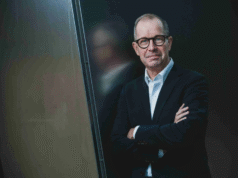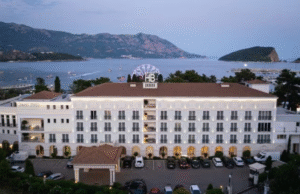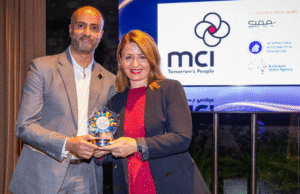Quality is not about numbers, but balance
In the realm of B2B events, an intriguing shift occurred after the COVID-19 pandemic, which halted nearly all B2B events and trade fairs. I can proudly say that Conventa’s machinery did not cease even during the hardest moments – we continued when most stagnated. Today, many industry peers ask me how to move forward: which events to attend, where to invest, and which events to support. Of course, I first highlight my own event, but as years pass, my admiration for colleagues who know how to maintain quality at their events grows steadily. Out of respect for all those who have been in this industry for decades, I wish to share some backstage insights unfamiliar to most.
The quality of events is directly correlated to their size. Among the largest trade shows, I have no problem highlighting IMEX as a best practice case of championing quality. The industry has recognised its quality-over-quantity approach. Although it seems large-scale trade shows are all about numbers, success does not lie in quantity, but in ensuring a balance between the number of exhibitors and the quality of hosted buyers. Those who know how to establish a balance between these two groups have a winning recipe.
In 2026, another event will attempt to infiltrate the ranks of IBTM and IMEX, the two preeminent global, large-scale B2B trade shows.
M&I Expo, organised by Worldwide Events, will take place in Abu Dhabi next year. Advocating quality over quantity, the organisers of the event have announced over 1,000 “elite” C-suite hosted buyers will convene at the trade show, twice as many as at their classic M&I “table-top” forums. In light of this announcement, we can expect fierce competition between the three giants to attract suppliers and pique the interest of the industry.
Even more interestingly, trade shows that always take place at the same location cannot rival the wow effect created by events that take place at different destinations each time. It might be the shine of new, compelling destinations that blinds event organisers, making them overlook many drawbacks. Hence, M&I will need to demonstrate how good they are at what they call “The Power of Scale”. The entire industry is eager to learn if they succeed.

A lesson about “warm bodies”
A few years ago, one of the most influential global industry experts taught me a valuable lesson: each trade show needs about 40% of “warm bodies”.
I was so shocked by this comment that it led me to the decision to create our own event without such walking zombies. The term refers to attendees who are physically present at the event, but are not necessarily qualified or competent hosted buyers.
These are attendees who fill the room, increase the number of attendees, and help organisers create the impression of a busy event.
Often, though, these “warm bodies” have no actual added value – they neither engage in meetings nor search for future partners, but are usually there for more trivial reasons (out of curiosity, networking, or free travel and snacks). Have you ever wondered how many such attendees you have met in the past?
A flood of superlatives
Since then, a lot of time has passed, and many events have mushroomed in our region and beyond. I helped organise, co-create, and participate in many of them. Yet, the flood of exceptional events we are witnessing now, all dubbed “so good”, “amazing”, and “next level”, is unprecedented. It is difficult to count them all – almost every day, a new one crops up. Every day, we read new superlatives, and every week, there is a new “revolution” in the world of B2B events.
It seems as if every event organised today desperately needs to be labelled the best, most unique, and unforgettable. Yet, behind the facade of these grandiose titles, it is difficult to recognise whether they actually carry merit. Amid a flood of superlatives, the essence of B2B is being lost. The genuine human connections, holistic, compelling content, and actual business value are being sidelined. Quantity reigns supreme over quality, glitz has replaced purpose and even reason, while attendance is often a goal in itself. Sometimes it seems these events are, by and large, famed for their thunderous parties and entertainment shows rather than meetings. Hence, today the question is no longer how many events there are, but how many of them are actually worth our time, money, and attention.

5 criteria to recognise a quality event
To begin with, we need to establish a distinction between apples and oranges. Large-scale events predominantly employ the FOMO concept to convey that the event is a must-attend. There is nothing wrong with this, of course. This, too, can be one of the criteria for evaluating the quality of our industry. Once we remove the facade, though, measurable criteria remain, which help us assess whether the event is just a picture-postcard setting or if it actually drives added value and business. Here are five of the most important criteria:
1. Balance between exhibitors and clients
The rule of thumb is to have at least 1.5 hosted buyers per supplier (150 hosted buyers for 100 suppliers). This balance ensures full schedules and relevant face-to-face meetings.
2. Guaranteed number of meetings
For a two-day event, the organisers should guarantee 25 to 30 pre-arranged meetings. Without this guarantee, attendees are risking their time and money.
3. Percentage of new hosted buyers
Fewer than 20% of new hosted buyers means the organisers have exhausted their database. In this case, attendees should demand clear information about the annual database of hosted buyers.
4. Database and GDPR
Event organisers who mean business will enable attendees full access to the entire database of confirmed hosted buyers for their next follow-up mailing. This way, they demonstrate that all information is processed according to the GDPR legislation.
5. Hosted buyers with genuine interest
If the event is regional, it should be attended by clients with a genuine interest in your destination or your product – without this, there can be no real inquiries.
Only an open and inclusive atmosphere can prompt organic, natural, unobstructed networking between exhibitors and hosted buyers.
Professional event organisers know how to measure the ROI of their events and do not shy away from publicly sharing the number of concrete inquiries the event generated. Yet, the quality of the event is not reflected only in numbers. To prove their professionalism, event organisers must demonstrate democracy and transparency (in social networking events, for instance). All accompanying and social events should be open to exhibitors to ensure transparency of business relations and prevent exclusion, “private” receptions, or hidden arrangements. Only an open and inclusive atmosphere can prompt organic, natural, unobstructed networking between exhibitors and hosted buyers.

When will artificial intelligence take the helm?
This year represents a major milestone for Conventa, not least because we will unveil our AI-powered tool.
For some time, we have been developing and testing the first AI-powered model for selecting hosted buyers in the events industry. The system has been surprising us, as it is becoming increasingly accurate at assessing the quality of registered applicants and slowly taking over the decision-making, which was previously managed entirely by humans and thus subjective.
In this light, Conventa is fortunate and privileged to have a higher interest than the number of available spots. Our AI model is thus helping us make a more objective and effective selection of hosted buyers.
Conventa is fueled by a precisely designed Matrix of the buyers’ quality, an advanced system that combines artificial intelligence, verified data sources, and human judgment based on 60 transparent criteria.
The model evaluates each registered candidate in five key areas:
- Professional background
- Business relevance
- Accuracy and credibility of data
- Credibility of references
- Strategic meaning for Conventa’s exhibitors
Based on these merits, each candidate receives a score from 1 to 100 and is segmented into one of six categories. The result is a selection system that is transparent, objective, and ethical – a real revolution in the events industry.
One of the system’s singularities is also its ability to recognise inactive or less relevant candidates, i.e., those that no longer work in the events industry. This combination of data analysis and human judgment renders Conventa one of the most advanced and innovative B2B events in New Europe.
The blacklist problem
Our novel tool will hopefully help us avoid individuals whom we only dare speak about in private. No one dares to point out the elephant in the room. In simple terms, we can call these individuals penny-pinchers – people who attend events without having an interest in making new partnerships. They most often join events because of the free benefits, travel, or opportunities for self-promotion.
Some of them are incredibly resourceful – to the point that they create fake websites, use fabricated references, and present themselves as legitimate event organisers. Such individuals not only harm the reputation of a brand but also undermine everyone’s trust in the events industry.
How to spot one?
- They register for events by providing incomplete or unclear company information
- Their website does not include traces of real projects, references, or clients
- They often use generic e-mail addresses (such as Gmail or Yahoo) and avoid presenting their role in the company
- Their LinkedIn business profiles are often incomplete, lack credible connections, or were made in haste (some months before the event)
- They often respond to questions about actual business needs or projects by providing generic or ambiguous answers.
It would be sensible for event organisers of distinguished, large-scale events to begin cooperating, exchanging verified information, and together establishing a joint “blacklist” of individuals who exploit the system.
Such an initiative would make a meaningful contribution to increased transparency and trust in the industry. Furthermore, it would safeguard the integrity of projects based on real business opportunities and partner relations. Cooperation between event organisers would also help the industry uncover suspicious entries. Event organisers could then educate partners and suppliers about possible threats. Ultimately, this would help event organisers set minimal standards for auditing candidates. Only by acting together can event organisers prevent individuals with dubious references from harming the reputation of the entire community of B2B event organisers.

VERA - the VAR system for the events industry
Due to an increase in the number of individuals who wish to harm the industry’s reputation, Conventa developed its own Matrix of the buyers’ quality, an advanced AI-powered system that recognises those who bring actual value and those who only seek free entertainment and a free vacation.
As the organisers, we are delighted by the results. Still, here and there, some suppliers claim “Conventa has poor hosted buyers”, despite not attending the event for over a decade. Alas, such counterpropaganda is a part of our industry.
In 2025, every hosted buyer at Conventa is reviewed by a team of three trained experts, aided by artificial intelligence, which we named VERA (Verification & Evaluation for Reliable Assessment). For now, our equivalent of VAR in football is still working in favour of human judgment. Time will tell how long before this technology transforms from our assistant referee to our head referee.
Creating opportunities or selling
I always underline that attending B2B events is not about direct sales but fostering opportunities. These are two different phases of the business process that we must know how to measure according to various criteria. The least effective is to hysterically hop from one event to the next, without a clear strategy, goals, or tracking results. It often seems as if the only criterion for selecting an event is the rule “exotic destination means more opportunities”. This rule of thumb is completely unsuitable, yet some event organisers still exploit it.
When a company or destination attends business events and shares the same values and brand promise, they build trust, stability, and long-term credibility among clients. However, companies that participate in one trade show one day and another on the next, and communicate something different every time, risk making their market position vague and unreliable. In the business events world, repetition brings continuous presence and consistency of messages – not just frequency of attending events. Clients need more contact with the same brand or destination before deciding on an in-depth collaboration.
People, not logos
Each edition – each new Conventa, IMEX, or IBTM – is a step closer to gaining trust in the eyes of clients. Hence, persistence is still the most powerful tool in the B2B world. After all these years in the events industry, I can say that success does not come from a single event, an award, or a statement. It comes from diligence, persistence, patience, and altruism. Events will come and go, but those who remain true to their story will stay ahead of the curve.
success in the events industry will be based on human intuition, trust, and events that build human connections.
Artificial intelligence, like our VERA, will undoubtedly change the way we select and evaluate buyers. But, even in the future, success in the events industry will be based on human intuition, trust, and events that build human connections. These values will only become more important in a digitalised world.
Only a handful of event organisers know how to organise an event that people return to year after year. They return because they believe in the event story that the organisers tell again and again. In the realm of B2B events, it is not the loudest who win, but those who remain authentic, genuine, and persistent. In other words, those who are humble and stay true to their principles.
You are invited to join the 18th edition of Conventa between 10 and 12 February 2026 in Ljubljana.














